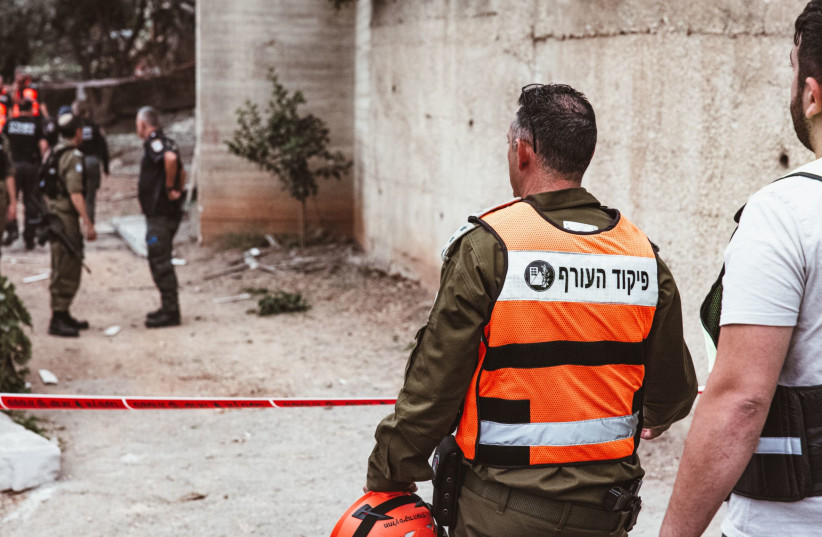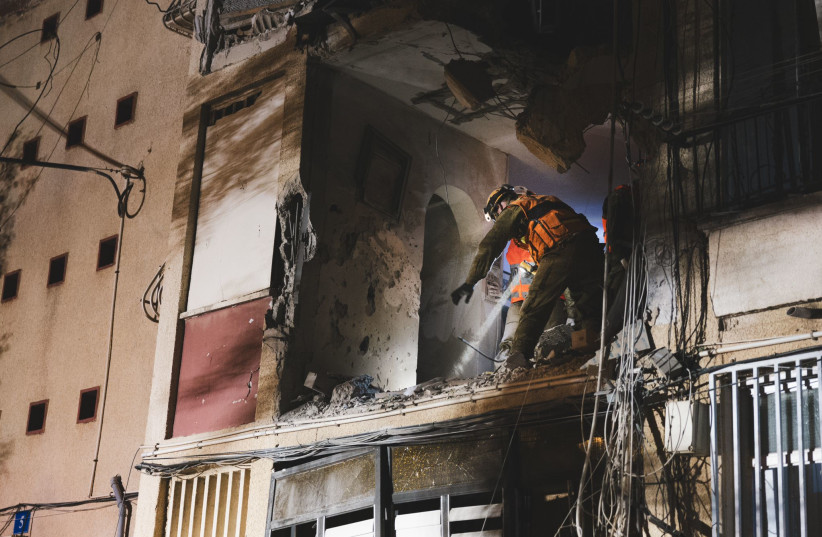Col. Amir Ben David is a senior officer in the Home Front Command and one of the nation’s key players safeguarding Israel’s citizens as the IDF engages Hamas in Gaza and Hezbollah in Lebanon.
“For the Home Front Command, the main goal is... doing everything we can to save the lives of the citizens of Israel,” said Ben David, the commander of Israel’s massive central district, from Rosh Ha’ayin and Petah Tikva to Rishon Lezion and Ness Ziona, with Jerusalem at its heart.
This is the largest district in Israel by population size.
Border cities
“We have 34 authorities [overseeing] three million civilians...We have a lot of cities that border Judea and Samaria,” he said.
Although this presents some security challenges, combating terrorism primarily is within the purview of the military and the police.

The Home Front Command is more civilian-oriented but has a wide variety of responsibilities. For instance, it works to prepare civilians for, and deals with the fallout of, rocket attacks, aids search and rescue, handles people who have been displaced by the war, trains people to protect themselves, among many other things.
These responsibilities have become central since Hamas attacked Israel on October 7.
Resettling displace Israelis
“When Hamas came into our cities and our kibbutzim and our bases and killed our people, although this was in the area of the Gaza Strip, Israelis feel like it was in every place in Israel,” Ben David said.
The horrors of October 7, and the consequences of the war that immediately followed, did indeed alter life for every person in Israel.
“Just in my district I have 71 hotels and around 20,000 people we [evacuated] from the Gaza border area and from the north. From Kiryat Shmona, from Sderot, from Be’eri.”
Suddenly, these communities were active military zones. Ben David was the first to greet many arriving on buses from evacuated communities to be lodged in Jerusalem district hotels.

“You see people that... we took them from hell. You can see in their eyes what happened over the previous 24 hours.
You hug them. You understand what they told you, and at night, when you go to sleep, you can imagine what Hamas has done,” he explained. “You take them to a safe place and you bring them everything, everything that you can think of. Clothes, healthcare. We opened a kindergarten. Everything they have at the kibbutz. These are the brave people. They are the heroes. Everything they need and everything we can give them, we give them.”
He explains that, speaking to these people, they tell him repeatedly that Israel must fight to win, in its entirety.
“Because when they come back to Be’eri, to Kfar Aza, to Sderot, they want to live in peace. They want to live with the knowledge that there is no threat from Gaza,” Ben David said.
Temporarily resettling displaced Israelis is just one of the duties he oversees.
A typical day for the Home Front commander goes something like this:
The day will begin with a situational assessment. He then goes to check on community institutions in the district, such as schools, to assess how they respond to emergency situations like rocket alarms or terror attacks.
He’ll then spend most of his day coordinating with and checking in on community leaders, such as the mayors in the district, the local battalions, and the people who have been relocated to the hotels. He’ll also make plans for the coming days and write protection guidelines critical to saving lives.
Meanwhile, the Home Front Command is training members of local communities to protect themselves as well. This entails arming certain community members.
“People want to protect their homes and their schools,” Ben David says. “We give them training and weapons. And now in every city you have something like platoons that are able to protect their communities.”
The individuals who receive weapons and training have military backgrounds, have gotten their certifications, and have been thoroughly vetted.
Ultimately though, communities all over the district have more people ready to act effectively at a moment’s notice.
Ben David goes on to offer advice that anyone can use in an emergency situation.
In the event of an incoming rocket attack, even if there’s no shelter to get to, you can help ensure your safety by simply lying down, the Home Front commander explains.
“Lying, not standing, not sitting,” he says. “There is a 99% chance that you will not be injured. This is because of the way the rocket explodes. If you are lying down, even if the rocket lands three or five meters from you and you are lying on the ground, you will be safe.”
It is crucial, he emphasizes, to follow the instructions from the Home Front Command. Put simply, those who do so survive.
“Together we will win,” he says. “We have only one mission. To win, to prepare our civilians for everything. When I go out and I see the children and I see the people and I see Am Yisrael, this is the reason why we do what we do. We need to win.”
